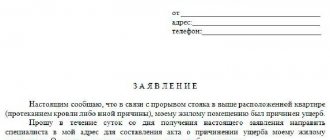What does a will provide?
The order is drawn up in the event of the death of the testator. It allows the owner of the property to determine the composition of the heirs and the size of their shares.
If necessary, the owner can disinherit a certain relative. For example, if there were conflicts in the family or one of the children abuses alcohol or is a drug addict.
The owner can assign his property not only to family members, but also to third parties. The heir may be an organization or local government.
If there is a will, applicants do not need to prove their relationship with the deceased citizen. The only condition is a timely application to a notary (within 6 months from the date of death of the owner). Otherwise, the beneficiary loses the advantage over applicants under the law and is deprived of property.
Is it possible to bequeath a mortgaged apartment?
The basic condition when drawing up a will is that the alienated property must belong to the testator (Article 1112 of the Civil Code of the Russian Federation). Obligations that are inextricably linked with the personality of a citizen are not inherited. Does the rule apply when applying for a mortgage? Yes.
Applying for a mortgage loan involves completing 2 transactions simultaneously:
- Purchase and sale. A citizen buys an apartment, registers ownership, and issues a mortgage.
- Loan. The borrower receives a loan, draws up a loan and mortgage agreement. The subject of the agreement is the purchased apartment. The housing will be pledged to the lender until the loan obligations are fully fulfilled. However, its owner is the borrower. He also uses the property.
Expert opinion
Stanislav Evseev
Lawyer. Experience 12 years. Specialization: civil, family, inheritance law.
The owner of the property can freely assign the apartment to the heirs. The only restriction is that the owner cannot sell or donate the apartment without the consent of the lender. The rule applies not only to the borrower, but also to his heirs. Additional features of the relationship between the lender and the borrower are reflected in the agreement (Article 346 of the Civil Code of the Russian Federation). Therefore, I recommend carefully studying the provisions of the loan agreement.
Thus, the bank cannot impose a ban on the transfer of mortgaged property by inheritance. Such actions are illegal. Any clauses in the loan agreement that limit the rights of the borrower regarding the transfer of real estate by inheritance are void (Article 37 of the Federal Law “On Mortgage”).
Do you need to inform your creditor of your intention to make a will? No. The testator is not obliged to notify the bank of his decision (Article 1119 of the Civil Code of the Russian Federation).
Owner's rights under the law
The rights of the legal owner of real estate are regulated by the Housing Code of the Russian Federation. According to Art. 30 of this legislative act, the owner can perform the following legal actions with his property:
- own, operate and dispose of;
- provide possession or use to another person legally (under a lease agreement, gratuitous use, donation, etc.);
- transfer for lease use to a legal entity.
At the same time, he is obliged:
- maintain your property and bear the corresponding expenses, and if we are talking about an apartment building, then take part in maintaining the common property of its residents;
- maintain the premises in order, show respect for the interests and rights of their neighbors, and also take care of the common property of the residents of the apartment building.
Art. 17 of the RF Housing Code establishes that residential premises must be used for living, but the law allows the use of property for commercial purposes.
Important! The main condition is that professional activities should not disturb neighbors or affect their interests. Read more about whether you can rent out an apartment with a mortgage.
How to draw up a will for an apartment with a mortgage
The process of registering a will for a mortgaged apartment
| No. | Action | A comment |
| 1 | The testator must contact any notary in the country | You need to have a package of documents with you, money to pay the state fee, and a list of applicants. The bank's permission is not required to draw up a will. The notary will establish the identity of the testator and check his legal capacity. |
| 2 | The notary explains the rights and obligations of the testator | One of the restrictions on freedom of expression is the rule of compulsory share. The owner cannot deprive socially vulnerable relatives of their property. A citizen can only dispose of personal property. |
| 3 | The notary draws up a draft will or checks the version presented by the testator | The document must not contain terms that violate the law. For example, a testamentary refusal with the condition that the heir enter into marriage with a specific person. |
| 4 | The testator reads the order | If a citizen cannot read it independently, then the document is read aloud by a notary |
| 5 | The notary certifies the document | The form is signed and stamped by a notary. Information about the order is entered into the register. |
| 6 | The testator signs the document | If a citizen cannot sign the order on his own, then it is necessary to involve a handyman. It is prohibited to register an expression of will through a representative. Therefore, the citizen must be personally present at the notary’s office. |
| 7 | Transferring a copy of the will to the testator and keeping a second copy with the notary | The testator can give his copy to the applicant or keep it for himself. Of course, it is better to notify the beneficiary of the existence of the document. Otherwise, if the testator dies, the property will go to the relatives by law. |
What to do if the alienated property is the joint property of the spouses? The testator can only sign away his part of the apartment. Half of the spouse is subject to separation from the inheritance upon the death of the testator. To obtain a certificate of marital share, you will need to submit a corresponding application to a notary.
Questions from our readers
Can an heir refuse a mortgaged apartment?
The testator may choose one or more legal successors. New owners have the right to refuse their part if they do not want to take on debt obligations. In this case, the share of the real estate will become the property of the bank. When all the heirs do not want to take on obligations, the financial institution takes the entire apartment and sells it at auction. If the proceeds are not enough to pay off the debt, then the remaining portion is written off by the bank.
In accordance with Art. 1157 of the Civil Code of the Russian Federation, a refusal can be issued either in favor of someone else specified in the will, or without specifying a specific person. It is impossible not to accept only part of the inheritance.
To formalize the refusal, you must submit a corresponding application to the notary’s office where the inheritance case has been opened. A citizen may not accept an inheritance if he does not contact an official within months. If the notary has information about the place of residence or work of the heirs indicated in the last will, then he will have to notify them about the will.
Procedure
Considering the lack of legal education among most citizens, the legislator has simplified the procedure for drawing up a will as much as possible. The notary monitors the legality of the testator's actions.
Procedure:
- Preparation of documents.
- Determination of the composition of applicants.
- Contacting a notary.
- Development of a draft will.
- Payment of state duty.
- Notarization of a document.
- Entering information into the state register.
Important! If the testator appointed an executor, then he will be responsible for the execution of the will (Article 1134 of the Civil Code of the Russian Federation). The key responsibility of the executor is to ensure that the property passes to the heirs.
Documentation
To make a will, the testator needs to prepare:
- Identification.
- List of heirs.
- Tax payment receipt.
Additional documents are not required by law. However, they may be required by a notary.
Most often required:
- copies of the heirs’ passports in order to write their full names and addresses correctly;
- title documents for property;
Such a requirement is quite logical. After all, mistakes made when drawing up a will can become a reason for refusing to issue a certificate or challenging the will.
Expenses
When registering a will, the testator needs to pay a state fee and notary services. The tax rate in 2021 is 100 rubles .
Additionally, you must pay for legal and technical services. Their cost depends on the region of circulation.
Tariffs are set by regional notary chambers. You can find out more about the cost on the website of the Federal Notary Chamber.
The price of an order in the Yamalo-Nenets Autonomous Okrug depends on the complexity of the document. A simple expression of will costs 2200 rubles , a complex one – 3300 rubles . One of the lowest tariffs is provided by the Republic of Dagestan. There the testator will pay only 900 rubles .
When calling a notary to your home, the state fee increases 1.5 times .
Additional costs may arise if the contents of the will are changed or a new document is drawn up.
Sample will
The order is drawn up in writing.
Basic details:
- place, date of compilation;
- Title of the document;
- testator's registration address;
- passport details of the testator;
- last will of a citizen;
- list of alienated property;
- list of applicants, their registration addresses;
- to whom and what share of the inheritance goes;
- number of the administrative document;
- link to pay the fee;
- testator's signature.
Sample will
Sample will
The document contains 2 options for the development of events:
- alienation of property that will belong to the testator at the time of death;
- transfer of specific property to heirs.
Step-by-step instructions: how to draw up documents?
An incorrectly executed will can be considered void, so the document must be drawn up in accordance with the current rules. You can write it yourself or with the help of a lawyer, but the document requires notarization.
Where to contact?
Attention. To draw up a will, you need to contact a notary office that services the territory where the testator lives or the territory where the property is located.
In some cases, it is possible to certify a will by the head physician of a medical institution, the head of a military unit, executive colony, etc. (if the testator is in these institutions).
If there is no notary in the locality, then the head of the municipal government can certify the will.
List of papers
The lawyer will require the following documents from the testator:
- passport;
- title agreement for real estate.
In addition, you may need certificates from a narcologist or psychiatrist about the legal capacity of the testator.
State duty
According to paragraph 13 of Art. 333.24 of the Tax Code of the Russian Federation, for certification of a will you need to pay a state duty in the amount of 100 rubles.
General design rules
A will must be drawn up in writing. The document must bear the testator's signature. According to the requirements for drawing up a will, it must bear the seal and signature of an authorized person (notary, chief physician, etc.).
How to write a paper?
Important. The most important requirement for the text of a will is unambiguity. The testator must express his will in such a way as to avoid any ambiguity.
Once completed, the document must be signed by the testator himself.
The text of the document itself states:
- information about the testator (personal and passport data);
- information about the authorized person (details of the organization, full name of the serving notary, head of administration, etc.);
- detailed information about the inheritance indicating the share of each successor;
- clause on familiarization with Art. 1149 of the Civil Code of the Russian Federation (on compulsory heirs);
- information about payment of state duty;
- certifying signature of the authorized person.
It is not necessary to indicate that the apartment is under mortgage. Subsequently, this data will come from Rosreestr.
If there are children
The testator can assign the mortgaged property to his wife, brother or children from his first marriage. The law does not contain any restrictions.
Even minor children can act as beneficiaries. When registering an inheritance, their interests will be represented by their parents or guardians. If the legal representatives want to refuse the inheritance, then they will have to obtain the written consent of the guardianship authority.
To whom are the loan obligations transferred? Acceptance of an inheritance implies the simultaneous transfer of the obligations of the testator to his legal successors (Article 1175 of the Civil Code of the Russian Federation). The amount of liability is limited to the value of the inherited property. Creditors can bring claims against beneficiaries within the statute of limitations.
However, minor children cannot be financially liable to the creditor. Their interests are represented by their parents.
They can:
- Accept the property and pay off the debt at your own expense. Repaying the parent's debt does not make them co-owners of the mortgaged apartment. The property remains the property of the child.
- Sell the apartment and close the mortgage loan. The difference between the value of the property and the amount of debt remains with the heir. However, to complete a transaction of property re-registered to a minor child, permission from the district guardianship department will be required.
- Refuse inheritance. To submit a waiver on behalf of a minor child, you must provide the notary with permission from the district guardianship department.
- Obtaining insurance from an insurance company. If the testator insured his life when drawing up a loan agreement, the heir or his representative can obtain insurance and close the debt.
How to avoid contesting a will
To prevent interested parties from challenging the will, it is necessary to provide the notary with a certificate of mental health.
When drawing up a document, you should take into account the interests of applicants who have the right to an obligatory share in the inheritance. If the untested share is not enough to satisfy their property rights, it is reimbursed from the bequeathed share.
In case the heir is recognized as unworthy (this is possible under Article 1117 of the Civil Code of the Russian Federation if he intentionally commits illegal actions against the owner of the apartment or other legal successors), an heir should be appointed.
Before signing, it is important to check the document for errors in the data and address of the property being inherited.
The owner of an apartment with a mortgage has the right to leave it to descendants or close people who are not relatives, taking advantage of the opportunity to draw up a will. The bank may indicate in the agreement that the borrower does not have the right to transfer the mortgage by will, but knowing the laws, this clause is easy to challenge.
When thinking about who to leave an inheritance to, do not forget that loan debts are part of the property, and by accepting a mortgaged apartment, the heir receives an encumbrance. The lawyers of the ros-nasledstvo.ru portal will tell you how to draw up a will without infringing on the rights of potential successors or burdening them with an unbearable burden.
FREE CONSULTATIONS are available for you! If you want to solve exactly your problem, then
:
- describe your situation to a lawyer in an online chat;
- write a question in the form below;
- call Moscow and Moscow region
- call St. Petersburg and region
Save or share the link on social networks
- FREE for a lawyer!
Write your question, our lawyer will prepare an answer for FREE and call you back in 5 minutes.
By submitting data you agree to the Consent to PD processing, PD Processing Policy and User Agreement
Useful information on the topic
4
How to restore the missed deadline for accepting an inheritance
The law limits the period allotted for accepting an inheritance to 6 months from...
12
How to prove and confirm relationship with the deceased
The presence of family ties is the main condition for a calling to inheritance...
31
How to challenge a will for an apartment?
According to Article 62 of the Civil Code of the Russian Federation (Civil Code of the Russian Federation), citizens...
56
How to properly draw up and write a will
The provisions on the will are contained in the third chapter of the Civil Code of the Russian Federation. According to…
101
Heirs of the first stage
The Civil Code of the Russian Federation defines two options for inheritance: by will and...
21
Inheritance of a privatized apartment after the death of the owner by law and will
After privatization, the apartment used on the basis of a social tenancy agreement passes...
Mandatory heirs
When drawing up a will, the testator must take into account the interests of the obligatory heirs. They are entitled to at least ½ of the property, which is usually claimed by the heirs by law (Article 1149 of the Civil Code of the Russian Federation).
When opening an inheritance case, the notary must check the composition of the heirs and identify the obligatory applicants. The part of the property assigned to him is separated from the untested property. If the testator has written off all the property, then the share of the heirs under the will is subject to reduction.
Refusal to award a share to obligatory heirs is permitted in exceptional cases. The main claimants to the property can initiate legal proceedings.
A mortgaged apartment is a dubious inheritance. Together with a share in the object, the citizen inherits credit obligations. Therefore, a compulsory heir can formalize a refusal to enter into an inheritance.
Underwater rocks
Citizens should consider the following nuances:
- Relatives who disagree with the last will of the testator have the right to challenge the will. The procedure is carried out through the court and only if there are compelling reasons, for example, doubts about the legal capacity or mental state of the testator. Therefore, when drawing up a document, it is recommended to provide the notary with a certificate from a psychiatrist.
- If spouses are planning a divorce, they must first divide their marital property. Each of them can only bequeath their share in the property.
- Not only relatives, but also other interested parties have the right to file a lawsuit regarding the invalidity of a document. The grounds may include violations of the form and procedure for authenticating the document, illegal actions against the testator by the heirs.
- If the will does not indicate relatives, then this cannot be a basis for challenging it. Dependents and minors must receive a mandatory share. The owner can dispose of the rest of the apartment at his own discretion.
Alienation of part of the mortgaged property
The owner can dispose of the property at his own discretion. The law does not provide for any restrictions.
The owner can alienate the whole object or only part of it. For example, if a person is a co-owner of an apartment and only owns 1/2 or 1/3 of the share.
If the owner of the property wants to assign his apartment to several heirs, then he can determine the share of each applicant or simply indicate them by name. Subsequently, the notary divided the property between the heirs independently. By default, the inheritance is divided between the claimants in equal shares.
Obligations under the mortgage pass to the heirs in full. The amount of debt is determined at the time of acceptance of the inheritance. If there are several beneficiaries, then the debt is distributed among them in accordance with the inherited share.
Features of inheriting real estate
Mortgage real estate, like any property, is part of the inheritance estate, therefore it is subject to legislation regarding the allocation of a mandatory share. In addition, the testator may, of his own free will, inherit property to several successors.
Its parts
If a will is made for several persons, then the co-owners of the property will be required to pay their part of the loan, proportional to the part in the property received by the will of the deceased.
For example, according to the will, an apartment worth 1.5 million rubles. passes to the testator's mother and his son in equal shares. At the time of death, the borrower still owed the bank 800 thousand rubles. This means that both the mother of the deceased and his son must pay the creditor 400 thousand rubles each.
If there are children
Even if the testator did not include his children in the will, they will receive their inheritance in accordance with the allocation of the obligatory share. This right is enjoyed by:
- children under 18 years of age;
- children under 23 years of age, subject to full-time studies at universities;
- unborn children, but conceived during the life of the testator;
- disabled dependent relatives by law who were supported by the testator for at least a year before his death;
- disabled dependents who lived together with the testator for more than a year.
Mandatory heirs (including children), if there is a will, will receive at least half of what they would have received in the absence of a will, including the loan debt. The responsibility to repay the loan instead of minor children who inherited mortgaged real estate rests with their legal representatives (parents, guardians, trustees). If it is not possible to repay the loan, then with the permission of the guardianship authorities you can refuse the inheritance.
When the heir reaches the age of majority, the parents or guardians who have repaid his debt to the bank have the right to file a recourse claim to reimburse their expenses.
Is it possible to challenge a will?
Interested parties can challenge the order for various reasons:
- inconsistency with the form;
- incapacity of the testator;
- recognition of the beneficiary as unworthy;
- other grounds for filing a claim.
If the plaintiffs manage to prove the stated facts, the court will invalidate the will. The mortgaged property will pass to the heirs by law. Property and loan obligations are distributed equally among the heirs.









